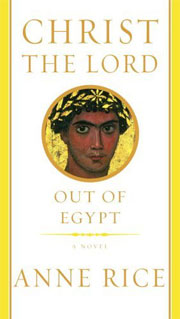Book Notes
 Anne Rice, Christ the Lord: Out of Egypt (New York: Knopf, 2005), 322pp.
Anne Rice, Christ the Lord: Out of Egypt (New York: Knopf, 2005), 322pp.
Anne Rice's enthusiastic fans love her for her twenty-five novels of fantasy that explore vampires, witches and the occult, not to mention homoeroticism and sadomasochism, which is why many people were stunned to read a Newsweek article (October 31,2005) in which she promised that henceforth she would "write only for the Lord." In a touching and candid "Author's Note" at the end of Christ the Lord (305–321), Rice recounts her strict upbringing in an Irish Catholic family, how and why she left the church for forty years, her forty-one-year marriage to an ardent atheist Stan Rice who died in 2002 of a brain tumor, and her return to the Catholic Church in 1998. Then "ready to do violence to my career...I consecrated myself and my work to Christ." The present novel is her first installment of a trilogy she intends to write on the life of Christ.
Rice has Jesus himself as a seven-year-old boy narrate this novel, and since we know virtually nothing about the childhood of Jesus, she has ventured into the provocative realm of "historical fiction," much as Frederick Buechner reimagined the life of the patriarch Jacob in his wonderful novel Son of Laughter. What Rice has attempted, then, is to explore what theologians call the "messianic consciousness" of Jesus. That is, just how, when and why did the fully human Jesus begin to realize exactly who he was? For a novelist this presents an extraordinarily complex challenge of character development, and readers will have to decide for themselves whether Rice has been successful in getting inside the head of a seven-year-old.
The novel opens when Jesus, only seven years old, curses a playground bully who consequently dies, and later raises him to life with yet another sort of spontaneous wish-prayer. Even then Jesus "felt the power go out of me." A few pages later she includes the apocryphal account from the Gospel of Thomas where Jesus turns clay pots into flying birds. But then life settles down for two hundred pages, and Rice takes the holy family out of Alexandria, Egypt, where Jesus spent the first seven years of his life, including study with Philo, back to Jerusalem and then on to Nazareth. Family silence and secrets about strange events surrounding his birth provoke Jesus's curiosity. But no one is speaking. Only in the last fifty pages does the novel heat up when Jesus's brother James, a thirteen-year-old, tells Jesus what he himself saw and witnessed at the nativity. In the final few pages his mother Mary, then about twenty, also tells Jesus how as a pregnant thirteen-year-old she was told that he would be "the begotten of God." And thus Jesus's first year in his own land ends. For what happens next, we'll have to wait for Rice's second installment, much of which she says is already written.


